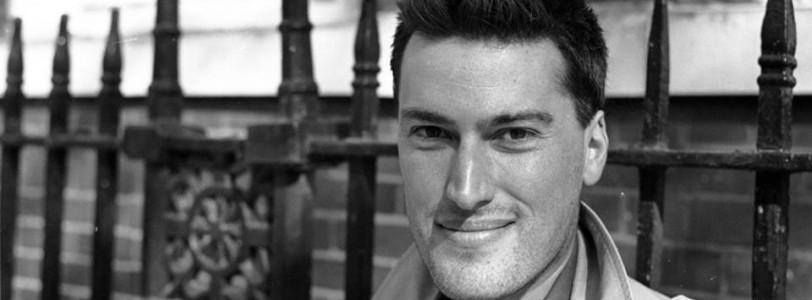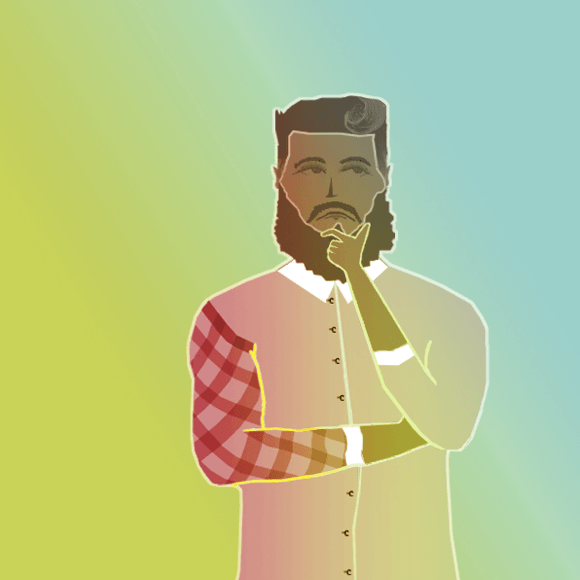Joe Craig is no stranger to interviews with Arts Award. We have spoken to him several times before, and each time he has been inviting and open, providing great insight into the world of a full-time author.
This interview was to be a little different, as I was expected to question him specifically about creativity. Upon arriving in northwest London, while getting battered by the wind, I suddenly realised that I hadn't prepared any questions surrounding this topic. For the first time when conducting an interview, I felt nervous and exposed.
This subsided somewhat upon arrival at Joe's house. He is an exceptionally calming influence. We casually discuss the pig leg hanging from the ceiling as he makes his oolong tea. As we settle on the sofas and break open the Kipferl biscuits I realise that this interview will undoubtedly end up being a long, unstructured one instead of the focused short piece I intended it to be.
On creativity
The interview started with honest intentions of being on topic. We discuss some of Joe's methods for generating creativity, with Joe highlighting that there are many different ways to best be creative. Some take walks or have baths to generate creativity, but those methods do not work for him. To really focus and develop an idea, Joe finds that his hands have to be busy for him to concentrate, be it through jotting down notes with a pen, typing on a keyboard or just playing with small objects.
In his office he has three large pin boards, each one representing a different project. He uses them to visualise "a blow-by-blow" account of the plot developments, and adds ideas as he comes up with them.
He says there are superficial differences between writing music and writing books. "Writing a song takes an hour, writing a book takes six month". However, the amount of creative energy required for both are the same.
Joe's own creative schedule is one to be envious of. He spends the mornings not trying to write, instead dedicating that time to the administrative tasks that come with being a writer. He will then relax by either watching a film or reading a book, followed by lunch. After lunch he will either begin writing, or finish the film. He has a 'strict' rule that if by 3pm he hasn't started writing, then he should try to start writing by 6pm. This however is problematic as you are then left with the quandary as to whether or not to start writing before or after tea. Providing he has nothing happening the next day then he is free to write late into the night.
On music
Joe's professional music career started out by writing music for other people, often in musical theatre. People would send their "finished" lyrics to him, and he would then build the songs around them, occasionally tidying up lyrics if required. He moved away from that style of work when he decided he wanted to get into pop song writing, as he felt that musical theatre didn't "suit his natural musical tendencies".
Joe tends to find that writing music away from the instrument is better, as it forces you to be more creative. He says that when at an instrument you are almost dictated by the comfortable positions your hands naturally go to, playing what is familiar to them through muscle memory. This however is not always a negative thing.
"Some of the best… or my most favourite moments in some of my songs are moments where I hit wrong chords, or I thought my hands were acting on autopilot but made a mistake and discovered something new"
He tends to find that the music and lyrics come together naturally, and rarely tries to strip the two apart. They are seen to be interlinked and codependent. "The music will only grow out of a lyrical thought or phrase." He sometimes tries to challenge himself by writing songs in this fashion, just to explore new ideas and concepts, but tends to find that the style is not for him.
Joe admitted that he used to view songwriting as pushing thick moss off of a slab, where underneath lies a perfect song. The belief that there is only one perfect way a song can be played, he mused, in hindsight was perhaps wrong. It certainly isn't how he views book writing, which can never be perfected.
On writing
While transitioning from writing musical theatre to writing pop songs, Joe found himself spending more time at home. During this period, he was able to do a lot of reading, and he became interested in stories and story structure. He also enjoyed watching movies, and it was after watching Harry Potter, the Bourne Identity and reading 'Story' by Robert Mckee that Joe said it was "impossible not to come up with the idea for the Jimmy Coates books".
Once he had that idea, he couldn't give it up, so had to pursue developing it further. He found that his music writing took a backseat to fleshing out the plot. "All of my creative energy and focus was developing that world in my head and in my notes". After writing the first two chapters he sent it to a lady to see if it was worth continuing. She was very encouraging and later became his agent. This was how Jimmy Coates began.
Although Joe calls Jimmy Coates his first book, this is not technically true. During his gap year, Joe stayed at home to write music, but after hearing that Frederick Forsyth wrote 'Day of the Jackal' by writing two thousand words a day, he figured if he did the same then he too would have a book. Again, enjoying the feeling of having his fingers occupied, he "bashed out" a story. While working on it he had the seeds of another idea growing, so he started writing that immediately after. In total he had written three stories by the end of that year. "The important thing was that I finished them" he laughed, expanding by emphasising just how bad they were. He found the experience really helpful when it came to writing Jimmy Coates, as the idea of writing a novel did not intimate him, he'd done it three times before.
"Things are meant to be bad sometimes, the first thing you write will be bad. That's great, that's the idea. Use that to free you up, and have fun".
On life
I always enjoy visiting Joe. As I've stated previously, I find him mentally stimulating, and eager to stretch his intellect and propose new social theories.
On this occasion Joe raised a point that left me stumped at the time, and days later have still been unable to really provide an answer to.
He asked how it was that it became socially acceptable, or expected, that musicians and authors can become millionaires. He makes the point that obviously not every musician or author will, but how come there are those who do at all. Surely they would still do what they did if they were just "well off". He then started to suggest that the money would be better redistributed, so there was a larger middle section, but fell short of proposing some socialist art policy. He did fall back onto using a well-worn argument of money being better spent on soldiers and nurses. In response to that, I suggested that the two operate within completely different market structures, and while nurses and soldiers get paid less, they get paid consistently. Meanwhile, artists risk going through life getting paid nothing at all. That felt lacklustre though. Would artists still do what they did if there wasn't the potential of millions? Perhaps it is an individual decision? I welcome your thoughts on the matter in the comments.
Listen to the interview
Although this article is quite long, it doesn't cover even a fraction of the content Joe and I discussed during the hour and a half long interview.
Some of the best bits have been used in the new 'Arts Award Voice Podcast', which we encourage you all to download and listen to. Details of this can be found here.
Alternatively, if you want the full interview, then it can be found on the 'Tom Inniss Interviews…' podcast, and there are two ways to listen to it.
Click here to listen in your browser (opens a new window)
Click here to download in iTunes (opens new window)









0 Comments